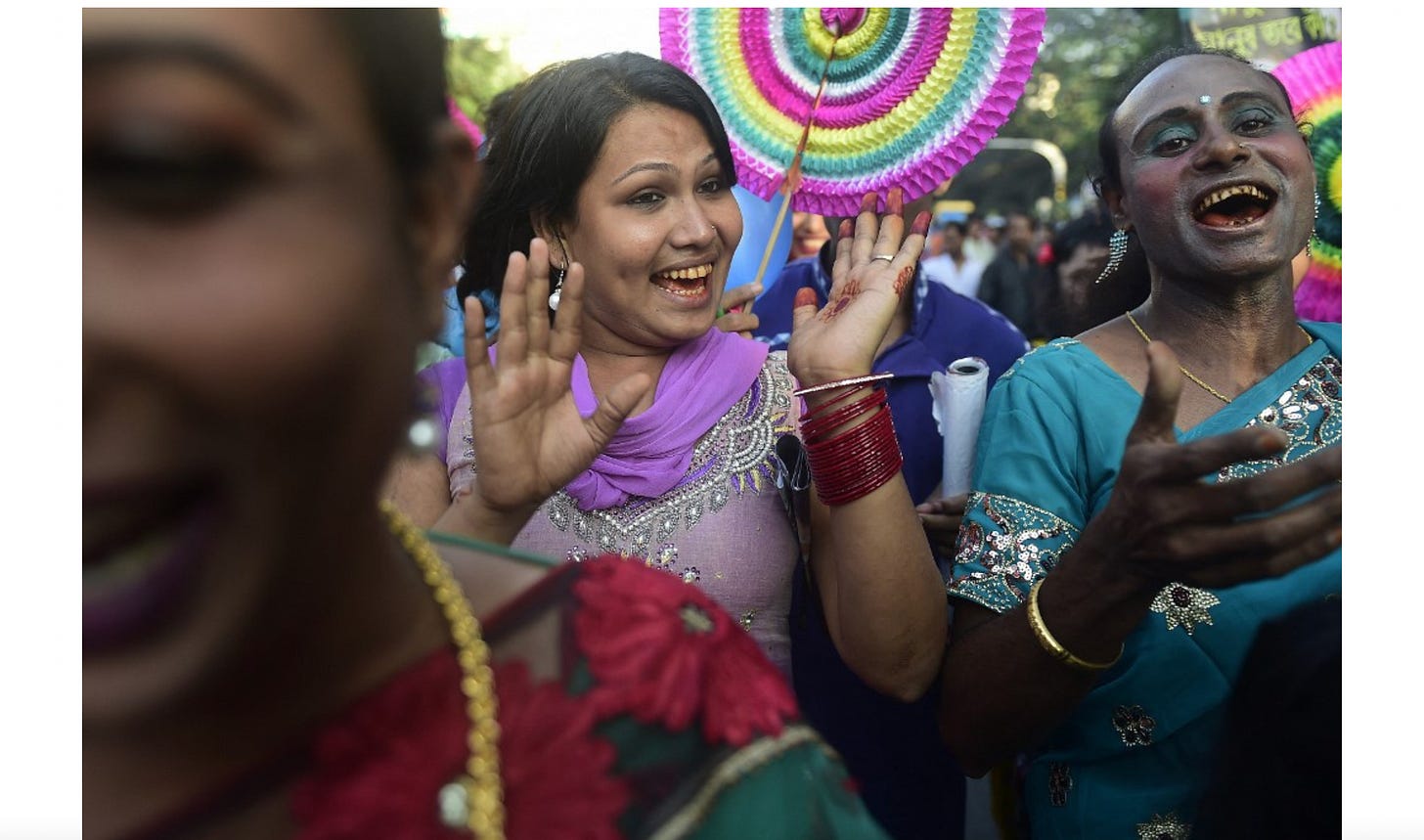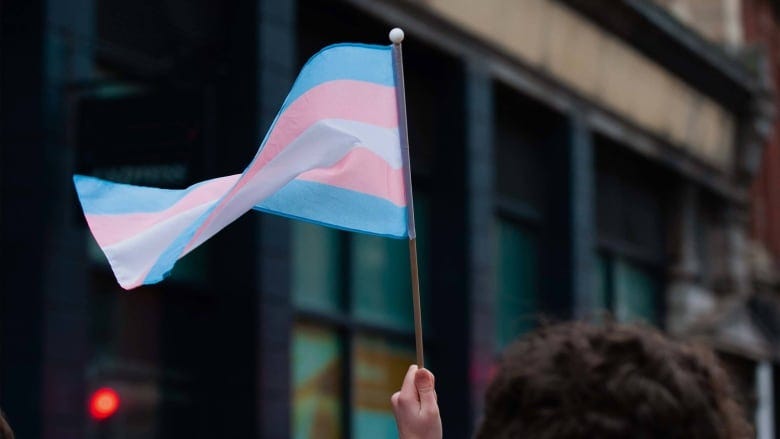Global Roundup: Bangladesh Mosque for Hijra Community, Canada Trans Day of Visibility, Human Rights Award for Trans Latina, Thailand LGBTQ Rights, Guide on Building Revolutionary Queer Community
Curated by FG Contributor Samiha Hossain
Bangladeshi hijras dance in the street during a rally to mark the first ever nationwide program to observe 'Hijra Day' in Dhaka on November 10, 2014. (AFP/Munir Uz Zaman)
In a first, Bangladesh has opened a mosque specifically for members of the Hijra community near Mymensingh, located north of the capital Dhaka. This comes amid challenges faced by the community because Hijras challenge traditional binary understandings of gender which leads to social stigma.
The humble structure, a single-room shed with walls and a roof clad in tin, was built on land donated by the government after the community was expelled from an established congregation. A similar endeavour planned in another city was stopped last month after a protest by locals. Dozens of local hijra women donated time and money to build the Dakshin Char Kalibari Masjid. It also has a graveyard, after a local Muslim cemetery last year refused to bury a young hijra woman inside its grounds.
Led by the 28-year-old community leader, Joyita Tonu, the opening ceremony last month reportedly spoke on the importance of providing a space free from discrimination. For many transgender individuals, the mosque is now a symbol of a newfound sense of belonging.
I never dreamt I could pray at a mosque again in my lifetime. People would tell us: 'Why are you hijra people here at the mosques? You should pray at home. Don't come to the mosques.’ It was shameful for us, so we didn't go. Now, this is our mosque. Now, no one can say no. -Sonia, 42
Founder of a hijra charity Mufti, Abdur Rahman Azad said that the new mosque has the status as the first-of-its-kind in the country. Notably, interpretations of Islamic religious texts by some hardliners view transgender identities as incompatible with Islamic teachings and this in turn leads to rejection and discrimination within the Muslim communities. The 65-year-old mosque's imam, Abdul Motaleb, said that the persecution of the hijra community was against the teachings of his faith.
They are like any other people created by Allah…We all are human beings. Maybe some are men, some are women, but all are human. Allah revealed the Holy Koran for all, so everyone has the right to pray, no one can be denied. -Abdul Motaleb
In 2013, Bangladesh took a step towards recognising the rights of the Hijra community by acknowledging them as a third gender. This decision was an important one in the struggle for equality and acceptance for the community in the country. Several have entered Bangladeshi politics, with one transgender woman elected mayor of a rural town in 2021.Nonetheless, they continue to face discrimination in education and employment, and high rates of violence.
Nicky Ebbage/iStock
Trans advocates in Canada used this year's International Transgender Day of Visibility on Sunday to shed light on their lived experiences — including celebrating trans people's positive societal contributions. Advocates such as Jake Farr say it's also important to draw attention to the discrimination that many trans, non-binary and two-spirit people face every day.
I'm consistently trying to break down all the myths: 'we don't know who we are' and 'we must have mental illness' and those kinds of things. We're just human beings. it's really got to stop. -Jake Farr
Farr and others — including Dean Lobo at Toronto non-profit, The 519 — say this year's Transgender Day of Visibility is especially significant given a recent string of government legislation they say is targeting trans youth. Last year, both the provinces of New Brunswick and Saskatchewan introduced policies requiring parental consent for students under 16 to change their pronouns and names at school. Earlier this year, the Premier of the province of Alberta, Danielle Smith, announced her government will introduce legislation in the fall of 2024 with measures to limit gender-affirming care for youth.
With everything that's going on in our world, in our country… it is very, very important for us to actively advocate visibly for the rights and safety of two-spirit, trans and gender diverse folks. -Dean Lobo
Michigan-based activist Rachel Crandall-Crocker started the Transgender Day of Visibility in 2009, in part to counter the prevalence of media coverage focused on violence against trans people. It's in that spirit that Ottawa's Fae Johnstone, executive director of The Society of Queer Momentum, a 2SLGBTQ+ non-profit, says she wants people to celebrate the positives of trans life even if it's less sensational than stories about acts of violence.
I want the world to see trans people contributing in arts and culture. We have… incredible poets, writers. We also have folks who are innovating in science and technology. We have trans folks who are your factory workers, your customer service representatives, your baristas. -Fae Johnstone
SHUTTERSTOCK; COURTESY ROBERT F. KENNEDY HUMAN RIGHTS
Westley, a transgender woman, moved to Louisiana from Honduras at a young age. She was charged with low-level drug and illegal re-entry charges in her youth, fueling her fight to end the criminalization of LGBTQ+ minors. She is now the Campaign Director at BreakOUT!, an organization that seeks to empower Black and Latinx transgender and gender nonconforming youth through leadership development programs.
If I think back to 2012 or 2013, when I was first beginning to identify as a trans woman, and all the things that I've had to overcome in order to get here, it's hard to believe that I would be recognized with this award. Especially being a trans woman of color, being an undocumented Latina woman, and all the challenges that that brings that I've had to confront being in the United States. -Arely Westley
Westley said that her being honored with the award comes at a "really crucial moment, especially in light of all the anti-trans bills and the anti-migrant bills that are being put forth, and the lack of access that we have to resources in the south." More than 550 anti-LGBTQ+ bills were introduced across the U.S. in 2023, and 80 were passed into law. These anti-transgender bills particularly impact immigrants, Westley said, many of whom already struggle to access key resources like health care.
Westley was detained in 2022 at the Central Louisiana ICE Processing Center (formally known as the LaSalle Immigration Detention Facility) in Jena, La. She experienced numerous human rights abuses, she said, including being held in solitary confinement solely for being a transgender woman. Since her release, Westley has led multiple shutdown campaigns calling for the closure of ICE detention facilities that have a documented history of abuse. Abolition of these facilities is key, she said, as reform has not created the change necessary to prevent human rights violations.
While Westley said that she's "honored" to receive the RFK Human Rights Award, she emphasized that it "not only belongs to me, but to all my trans sisters who in one way or another are in the struggle and resistance to live."
Photo by Lauren DeCicca/Getty Images
Thailand's lower house of parliament passed last Wednesday a bill that would legalize same-sex unions in the country. The text still needs the Senate's approval and the king's endorsement to become law.
Thailand has one of the most open LGBTQ communities in Asia, but activists have said Thai conservative laws do not represent the community despite the changing social attitudes in the country. The bill was passed by an overwhelming majority of the 415 lawmakers present, with 10 votes against.
Today society has proved to us that they care about LGBT rights. Now we finally will have same rights as others. -Tunyawaj Kamolwongwat, a member of the progressive Move Forward Party
If passed, the bill would make Thailand the first country in Southeast Asia to legalize same-sex marriage. The bill scraps references to "men," "women," "husbands" and "wives" in favor of gender-neutral terms. Despite Thailand's vibrant gay and transgender community, the Thai LGBTQ community lacks many rights reserved for legal partners. The new law would grant same-sex couples the right to adopt children. Several privileges would also be made available, such as tax deductions, medical consent for spouses, joint property management and inheritance rights.
Photo by Brian Vu
Writer, actor, and artist Jezz Chung’s new book, This Way to Change: A Gentle Guide to Personal Transformation and Collective Liberation, is a guide for a long-term commitment to the revolutionary struggle.
Chung began to write the current version of the book in 2020, when the COVID-19 pandemic, movement for Black Lives, and demands for abolition transformed the U.S. Around the same time, Chung decided to leave their eight-year career in marketing to work as an artist full-time. Through that process, they had an epiphany.
I realized, it's not just about making work, disseminating information, helping to educate, and trying to tell these stories, It's about changing the world within me, too. -Jezz Chung
In many ways, the book is a culmination of these learnings. There are guided questions to help navigate conversations that encourage psychological safety (“I need to vent. Are you in a place to listen?”) and diagrams to help find community (“explore new pleasures, collaborate on a project, if you agree to attend, try to show up and follow up”).
Chung says it was hard to release a book and promote it “in the midst of so much horror, trauma, and grief.” They highlight the importance of queer friendship to them. They found queer community in April 2021 because of Sammy Kim, an artist and nightlife organizer in New York, who brought people together for this event called Protect Asian Lives.
Once I made friends through that organizing event, it was a reminder that if I continue to devote my life to the movement for collective liberation, if I continue showing up in this way, transforming myself and strengthening my values, I'm going to meet people who are on similar paths. We're like magnets. We're all doing this work, and then we meet each other, and then we amplify each other's power and learn from each other. -Jezz Chung
In the interview with the media platform them, Chung speaks more in depth about their book, how community is an antidote to depression, the endless magic of queer friendship, and how protest can tether us to the world we yearn for.
Samiha Hossain (she/her) is an aspiring urban planner studying at Toronto Metropolitan University. Throughout the years, she has worked in nonprofits with survivors of sexual violence and youth. Samiha firmly believes in the power of connecting with people and listening to their stories to create solidarity and heal as a community. She loves learning about the diverse forms of feminist resistance around the world.








